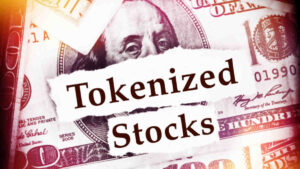ASX loses out on rising cryptocurrency trend as companies head for other exchanges

The ASX’s strong stance against cryptocurrency linked companies has seen the exchange dump several companies and make it difficult for new players to list.
Now the crypto world has cottoned onto the fact that other exchanges are more welcoming.
This has seen new and existing players turn to the likes of the Toronto Stock Exchange (TSX) and the National Stock Exchange (ASX:NSX).
After leaving the ASX in March, game maker Animoca Brands decided to list its fitness and health technology subsidiary OliveX Holdings on the NSX.
Hong Kong-based OliveX makes fitness apps, such as 22 Pushups and Lympo Squat which allow users to earn cryptocurrency by doing squats.
During the September quarter last year, Animoca raised $US2.01m ($2.9m) in cash and crypto via a Simple Agreement for Future Equity (SAFE) security, and also presold utility tokens via its gaming subsidiary TSB Gaming.
However, the company fell foul of the ASX — which has repeatedly expressed its disapproval of companies raising funds via cryptocurrencies — and subsequently departed the local bourse in March.
The ASX has also delisted other companies that were dabbling in crypto, including Byte Power and First Growth Funds.
The market operator is relying on guidance from ASIC that many initial coin offers (ICO) and crypto assets are likely to be managed investment funds at worst, and therefore need an Australian Financial Services Licence (AFSL).
TSX crypto friendly
Australian crypto payments service provider Banxa, which was established in 2014, is looking to become a listed company, and being a true-blue Aussie it wanted to list on the ASX.
But the difficulty in doing so has prompted it to head to the TSX Venture Exchange (TSXV).
“I would have loved to have listed on the ASX given that the company was established in Australia and the key people are Australian,” founder and non-executive chairman Domenic Carosa told Stockhead.
“But this is an example of the ASX taking a view that crypto companies are basically not welcome on the exchange. From my perspective I think that’s an unfortunate decision, and one that means Australian companies need to look abroad from a capital raising and from an exchange perspective.”
However, Carosa said the two major Canadian exchanges, the TSX and the Canadian Securities Exchange (CSE), were both “very open to crypto and crypto-related companies”.
In trying to decide which exchange to list on, Banxa met with exchanges and advisors in Australia, Singapore, Hong Kong, the UK and Canada.
“We decided on the TSX because they’re the largest exchange in Canada,” Carosa told Stockhead.
“In terms of the number of companies listed and the number of IPO’s in the last 12-18 months, it just dwarfs the ASX.
“We decided to list onto this exchange because we can very easily dual-list on the comparable US exchange once we’re listed on the TSX and once we’re at a certain size, there’s a migration path to NASDAQ as well.”
The TSX is the senior equity market, while the TSXV is a public venture capital marketplace for emerging companies. Both are owned by the TMX Group.
Crypto players getting a ‘fair go’ on other Aussie exchanges
Australia is not completely off limits for crypto companies, however, with both the NSX and the Sydney Stock Exchange (SSX) open to listing them.
“Irrespective of industry sector, the SSX is in the business of listing suitable companies through efficient, supportive and best in class governance listing rules which support growth companies to reach their potential,” Antony Tolfts, director – market supervision and listing compliance for the SSX, told Stockhead.
“The SSX gives prospective companies, from all industry sectors, a ‘fair go’ to provide an efficient path to market for qualifying growth companies.
“Companies operating within the digital and crypto space would receive an objective review with the same due diligence and evaluation under the listing rules as any other company looking to list or already listed.”
Tolfts said most companies operating in the digital and crypto sector used a blockchain platform to support their business.
The SSX is “passionate about blockchain to support digital technology”, Tolfts said, and its CEO Michael Go also sits on the board of industry body Blockchain Australia.
North American investors less crypto conservative
Banxa expects to have a market cap of around $41m on listing, and Carosa was of the view that the TSXV would be a better fit than the smaller exchanges in Australia given the global nature of its business.
“We just thought the TSX provides the right kind of coverage for a global company and the fact that we can dual list in the US and get access to North American investors was also quite attractive for us,” he said.
Canadian and US investors are a lot less conservative when it comes to backing crypto companies, according to Carosa.
“Australians by their nature are typically quite conservative, and so we’ve found the bulk of our investors have come from Asia and the Americas. There just seems to be much more appetite for a crypto-style business outside of Australia than actually within Australia, which once again is unfortunate.”
“I’m originally from Melbourne and I’m now living in Amsterdam. I’ve been living here for the last four years.”
“For me that’s a bit of a shame because my heart is still very much in Australia, but at the end of the day from a ‘follow the money perspective’, there is certainly more appetite and interest for crypto outside of Australia and we’ve just had to pursue a global exchange that reflects the values of Banxa.”
Banxa just completed a pre-IPO funding round, which included ASX-listed tech investor Thorney Technologies (ASX:TEK), and is in the final stages of listing on the TSXV, which it expects to do within the next couple of months.
Related Topics
UNLOCK INSIGHTS
Discover the untold stories of emerging ASX stocks.
Daily news and expert analysis, it's free to subscribe.
By proceeding, you confirm you understand that we handle personal information in accordance with our Privacy Policy.








